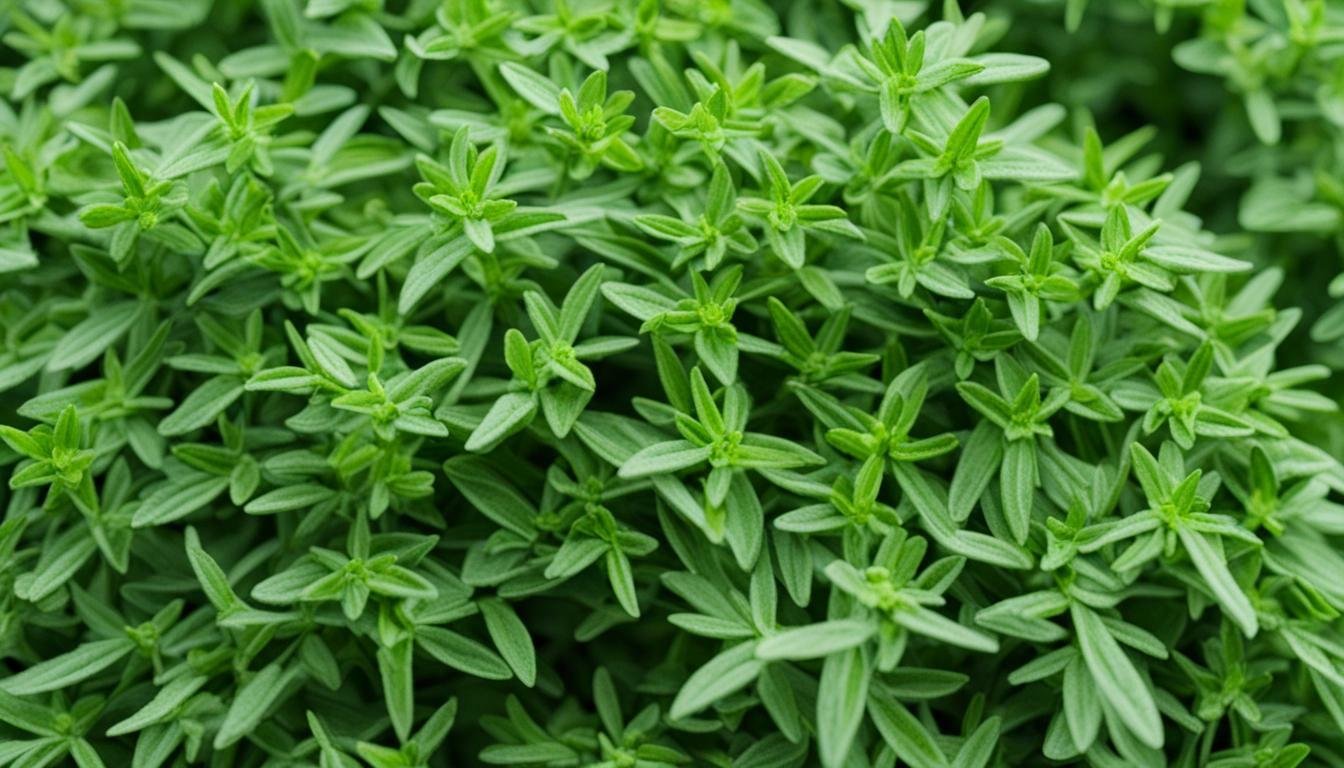Find Natural Relief from Congestion
I’ve always been convinced of nature’s healing powers. For years I’ve grown my own organic herbs like thyme, oregano, peppermint and more, trusting in their medicinal properties to help keep my family healthy. When it comes to relieving respiratory congestion, I find thyme to be one of the most effective from my home garden. Thyme thrives easily outside and contains powerful compounds that fight inflammation and bacteria.
Nasal and respiratory congestion accompanied by sore, irritated throats can be extremely uncomfortable. Fortunately, there are natural herbal remedies that provide effective relief from congestion when sourced locally and organically.
Certain herbs contain beneficial compounds and properties that alleviate congestion, fight bacteria, reduce inflammation, and soothe irritated throats. Harnessing the power of these herbs is an excellent way to clear congestion without relying on over-the-counter medications.
Key Points:
- Thyme is a natural remedy with powerful compounds that can effectively relieve congestion
- Ginger, garlic, peppermint, green tea, and chamomile are other herbal remedies that can alleviate congestion
- Local herbs like rosemary, oregano, basil, and dill offer additional health benefits
- Using fresh and organic herbs is important for optimal results and overall well-being
Discover the Power of Thyme for Congestion Relief
One of the most powerful natural herbal remedies for congestion is thyme. Thyme contains active compounds such as thymol and carvacrol which possess potent antibacterial and anti-inflammatory properties. These properties make thyme highly effective at treating respiratory congestion and soothing irritated throats when the herb is sourced fresh.
Thyme has been used for centuries around the world as a trusted remedy for congestion. Whether enjoyed in its fresh sprig form, as dried leaves, or as an essential oil, thyme offers an accessible and reliable way to combat congestion thanks to its medicinal compounds. Just a few drops of thyme essential oil in a diffuser or steam inhalation treatment can provide immediate relief.
But while thyme is potent, congestion relief sometimes requires a combination approach. I often rely on thyme alongside other home-grown herbs like ginger, garlic, green tea and chamomile to provide additional decongestant and antibacterial effects. My herb garden provides me with the natural medicines I need to keep my family’s respiratory health in check. I’m proud to be able to harness nature’s healing powers using herbs I’ve grown and tended myself.
Other beneficial herbs for congestion include:
- Ginger – Contains anti-inflammatory compounds called gingerols
- Garlic – Delivers antimicrobial and decongestant sulfur compounds
- Peppermint – Menthol provides a cooling, decongestant effect
- Green Tea – Powerful antioxidants reduce inflammation
- Chamomile – Anti-inflammatory effect calms inflamed tissues
When sourced fresh and from your own garden, these herbs can provide additional relief for respiratory congestion and sore throats. Enjoying them as teas, added to meals, or as supplements is an excellent way to harness their benefits.
In addition to the above herbs, local options like rosemary, oregano, basil, and dill offer congestion relief and other health benefits when enjoyed fresh and organic. Picking these fresh herbs right from your garden or sourcing them locally can maximize their medicinal effects.
In summary, thyme along with other herbs like ginger, garlic, peppermint and more provide natural relief from congestion when enjoyed in their fresh, local forms. Harnessing the power of these herbal remedies can clear congestion effectively without relying on medications.
How Thyme Relieves Congestion
Let’s take a closer look at why thyme is so effective at relieving congestion and irritated throats:
Thyme contains two important medicinal compounds – thymol and carvacrol. Research shows these compounds have antibacterial and anti-inflammatory properties. This means they can:
- Fight bacteria that cause respiratory illness and infection
- Reduce inflammation in the nasal passages and throat
This results in easier breathing, less nasal congestion, and less pain from inflammation. Thyme has been relied upon for centuries around the world to treat coughs, colds, bronchitis and other respiratory ailments thanks to these properties.
Some of the ways thyme can be used to harness its congestion-relieving effects include:
- Fresh sprigs – Add to meals or steep as tea
- Dried leaves – Crush to release oils or steep as tea
- Essential oil – Diffuse, inhale or apply topically
The essential oil offers the most concentrated medicinal effects. Just inhaling the aroma of thyme essential oil can provide relief thanks to the volatile plant compounds.
It’s also important to note that in addition to its medicinal properties, thyme contains vitamins, minerals and antioxidants that support overall wellbeing. Using fresh thyme in cooking adds a delicious flavor to dishes while also boosting your health.
By incorporating fresh, local thyme and other herbs into your daily routine, you can experience their natural decongestant and anti-inflammatory benefits. This helps relieve congestion without relying on conventional medications that can cause unwanted side effects.
Explore Other Herbal Remedies for Congestion
While thyme is one of the most powerful herbs for relieving congestion, several other traditional herbal remedies can also provide relief when sourced locally and organically. Let’s explore some other herbs that have been used for centuries to clear congestion and soothe irritated respiratory passages:
Ginger and Garlic
Ginger and garlic have potent medicinal properties that help fight respiratory congestion. Both contain specialized compounds that have natural decongestant, antibacterial, and anti-inflammatory benefits:
- Ginger contains gingerol, a compound with proven anti-inflammatory and antioxidant effects. This can help soothe inflammation in nasal passages.
- Garlic has allicin, an organosulfur compound with powerful antimicrobial properties that fights bacteria and viruses. Garlic also increases circulation.
Enjoying ginger and garlic in their fresh forms, such as in meals, herbal teas, or taking supplements, is an excellent way to harness their decongestant powers. This provides relief by reducing nasal inflammation and fighting respiratory illness.
Soothing Peppermint
The menthol naturally found in peppermint makes it very effective at clearing congestion. Menthol has cooling decongestant properties that open up nasal passageways and encourage air flow.
Peppermint can be consumed as a relaxing tea by steeping fresh or dried leaves in hot water. Inhaling the steam of a hot peppermint tea can also clear sinus pressure. Peppermint essential oil can also be applied topically or diffused to experience the decongestant benefits.
Green Tea
While best known as a popular beverage, green tea also offers medicinal benefits that can alleviate respiratory congestion. The polyphenols and catechins in green tea, especially the EGCG catechin, are antioxidants that have natural anti-inflammatory effects in the body.
This inflammation-reducing ability helps shrink swollen nasal tissues that restrict air flow during congestion. Enjoying 2-3 cups of locally-sourced organic green tea daily is a great way to harness these benefits.
Calming Chamomile
The herb chamomile is beloved for its relaxing properties, but it can also provide congestion relief. Chamomile contains apigenin, an antioxidant compound that reduces inflammation. This allows it to calm swollen respiratory passages to promote easier breathing.
Drinking chamomile tea is the most popular way to enjoy this herb. You can also inhale chamomile steam or apply it topically with an essential oil. With regular use, it can reduce congestion by decreasing inflammation.
As you can see, herbs like ginger, garlic, peppermint, green tea and chamomile have well-established abilities to fight respiratory congestion thanks to their anti-inflammatory, antimicrobial, and decongestant compounds. While conventional medications also alleviate congestion, using natural herbal remedies is an excellent alternative with fewer side effects.
Of course, it’s important to consult your healthcare provider before trying any new herbal supplement, especially if you have underlying medical conditions or take other medications. Your provider can guide you in determining which herbs are best for your individual health needs.
Discover More Local Herbs for Wellness
In addition to providing congestion relief, local organic herbs like rosemary, oregano, basil and dill offer many other wellness benefits. Adding these fresh herbs to your diet is an easy way to boost overall health.
The Health Benefits of Rosemary
Rosemary contains beneficial bioactive compounds like rosmarinic acid and carnosic acid. These act as antioxidants and anti-inflammatories within the body. Research shows rosemary can:
- Improve memory, cognition and mood
- Reduce inflammation and pain
- Lower risk of respiratory illness
- Increase blood circulation
Enjoy rosemary’s healing properties by using the fresh or dried herb in cooking, herbal teas, essential oils or extracts.
Immune-Boosting Oregano
Oregano has extremely high levels of antioxidants, including phenols, flavonoids and rosmarinic acid. These antioxidants give oregano strong antimicrobial properties that can help fight bacteria and viruses.
Studies show oregano oil in particular can be used to:
- Alleviate sinus congestion and other respiratory ailments
- Decrease inflammation and pain
- Strengthen the immune system against illness
Add fresh or dried oregano to food, take it as a supplement, or use the essential oil for maximum benefits.
Soothing Basil
Basil provides antioxidants like linalool, citronellol, and geraniol — all of which reduce inflammation in the body. Routine consumption of basil can help:
- Fight respiratory infections thanks to its antibacterial effects
- Soothe digestive discomfort and nausea
- Protect liver function
- Support cardiovascular health
Grow your own basil or source it locally to make fresh pesto, soups, salads and more.
Nutritious Dill
Dill contains unique bioactive compounds like monoterpenes, flavonoids and minerals. These provide antioxidant, anti-inflammatory, antimicrobial and digestive benefits. Daily dill can:
- Soothe digestion and relieve stomach discomfort
- Reduce bad cholesterol levels
- Lower blood pressure
- Protect against cancer cell growth
Add fresh dill to fish, salads, pickles, dips and more for its taste and health benefits.
As you can see, adding local rosemary, oregano, basil and dill to your diet is an easy way to promote overall wellbeing. Their anti-inflammatory, antimicrobial and antioxidant properties support whole body health in addition to relieving congestion.
Experience the Healing Power of Herbs
Nature provides us with powerful herbal medicines that can be used safely and effectively for congestion relief and overall wellness. Thyme, garlic, ginger, peppermint, green tea, chamomile and other herbs contain specialized compounds that fight inflammation, bacteria, viruses and more.
Sourcing these herbs fresh and locally allows you to maximize their natural medicinal properties. Adding them to your diet routinely can enhance wellbeing and help alleviate respiratory congestion as an alternative to conventional medications.
Always speak to a healthcare provider before beginning herbal supplements. But harnessing the healing power of nature provides a safe, effective option for supporting wellness and breathing easier.
| Herb | Health Benefits |
|---|---|
| Rosemary | Antioxidant and anti-inflammatory properties |
| Oregano | Respiratory support and immune system boost |
| Basil | Antibacterial and digestive support |
| Dill | Calming effects on the digestive system |
Conclusion
In conclusion, respiratory congestion and irritated throats don’t have to be suffered through without relief. Nature provides us with powerful herbal medicines that can alleviate congestion effectively when sourced locally and utilized in their fresh forms. Thyme, garlic, ginger, peppermint, green tea, chamomile and other herbs contain specialized compounds that open airways, fight bacteria and inflammation, and soothe irritated throats. Adding these herbs into your daily diet can provide safe, natural congestion relief without the need for medications in many cases. Furthermore, herbs like rosemary, oregano, basil and dill offer additional wellness benefits from their anti-inflammatory, antimicrobial and antioxidant properties. Harnessing the healing power of these natural remedies can help you breathe easier while enhancing your overall health and vitality.
FAQ
What herbs are best for relieving congestion?
Thyme, garlic, ginger, peppermint, green tea and chamomile are some of the most effective herbs for congestion relief based on their decongestant, antibacterial and anti-inflammatory properties.
How can I use thyme to relieve congestion?
Thyme can be used as fresh sprigs, dried leaves, essential oil, or as an herbal tea. The essential oil in particular provides potent medicinal effects when diffused or inhaled.
Is it safe to take herbs while on medications?
It’s best to consult your doctor before taking herbal supplements, especially if you take prescription medications or have underlying health conditions. Your doctor can advise if there are any interactions.
How quickly do herbal remedies relieve congestion?
Most people begin experiencing relief within a few days of routine herbal use. Effects such as easier breathing and less inflammation are noticeable with consistent daily consumption.
What’s the best way to take garlic for congestion?
Enjoying raw garlic in dishes, taking a garlic supplement, or using garlic essential oil are effective ways to harness its decongestant benefits.
Can I grow my own herbs for congestion relief?
Absolutely! Growing your own organic herbs like thyme, peppermint, basil and more at home is an excellent way to have fresh medicine readily available.
Are herbal remedies safe for children?
Herbal remedies can be safely used for children but should be administered based on age-appropriate dosing guidelines. Consult your pediatrician before giving any new herb.







